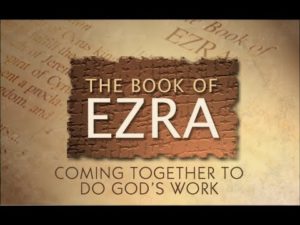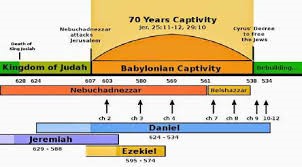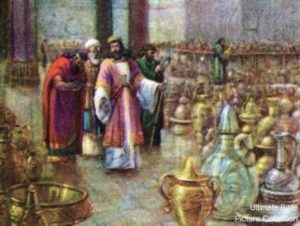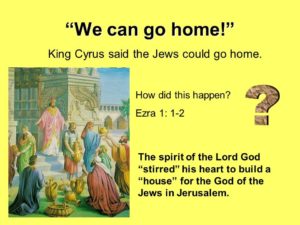TODAY’S READING FROM THE OLD TESTAMENT- EZRA 1:1-2:70
Originally, in ancient times, the books of Ezra and Nehemiah were counted as one scroll titled “Ezra-Nehemiah”. It is believed by many scholars that these books are compilations of material acquired from different sources and put together by the same author who compiled the material found in 1 and 2 Chronicles. There are commonalities between these four books. For example, 2 Chronicles ends with the Edict of Persia’s King Cyrus in 538 B.C., permitting the Jewish exiles to return from the Babylonian captivity and resettle in Jerusalem. The Book of Ezra begins where 2 Chronicles leaves off. Like the Book of 1 and 2 Chronicles, the Books of Ezra and Nehemiah focus predominantly on the history of Jerusalem and the temple. Chronicles records the history of the temple’s original construction under the reign of Solomon, and Ezra records its post-exilic reconstruction and Nehemiah records the repair and reconstruction of Jerusalem’s walls.
One observable contrast is that Chronicles downplays or passes over Solomon’s sinful multiplication of wives and idolatrous practices, whereas in the Book of Nehemiah, his sins are called out:
Nehemiah 13:26 26 “Did not Solomon king of Israel sin regarding these things? Yet among the many nations there was no king like him, and he was loved by his God, and God made him king over all Israel; nevertheless the foreign women caused even him to sin.”
The compilations of Ezra and Nehemiah both include portions written by Ezra and Nehemiah in the first person. Ezra 7:27-9:15 is known as “The Memoir of Ezra”.
The Book of Ezra covers about 100 years of history, from King Cyrus of Persia issuing his Edict permitting the Jews to return to their homeland in 538 B.C., to the rebuilding of the city walls in Jerusalem after Nehemiah’s arrival there in 445 B.C.
Chapters 1-6 occur before Ezra’s time. It covers the first wave of exiles that return with Zerubbabel and the priest Jeshua in 538-535 BC. Chapters 7 to 10 cover a time beginning with Ezra’s arrival in Jerusalem some 70 years later in 458.
The Books of 1 and 2 Chronicles, Ezra, and Nehemiah were composed in this post-exilic period. No more is there a king on the throne in the northern or southern kingdoms. The glory and gory days of the kings of Israel and Judah are over. However, the chronicler knows the story is not over. The theme of Ezra is the faithfulness of God. His promise to finish the work He has started remains. There is Another Son of David to come and He will reign forever!
The theme of the Book of Ezra is faithfulness- God is faithful to His promises and He calls His people to be faithful to His Word, to His call, and to His work.
Notice that the Book begins with a reminder of God’s faithfulness to bring to fulfillment the prophecies of Jeremiah.
Ezra 1:1-2 1 Now in the first year of Cyrus king of Persia, in order to fulfill the word of the LORD by the mouth of Jeremiah, the LORD stirred up the spirit of Cyrus king of Persia, so that he sent a proclamation throughout all his kingdom, and also put it in writing, saying: 2 “Thus says Cyrus king of Persia, ‘The LORD, the God of heaven, has given me all the kingdoms of the earth and He has appointed me to build Him a house in Jerusalem, which is in Judah.
God is faithful to His Word and He is sovereign over all of history. Ezra recounts a ‘mini-exodus’. Whereas Moses recorded the massive exodus from Egypt at the Passover, the Book of Ezra records the exodus of God’s people from their Babylonian captivity. God hardened the proud resistant heart of Pharaoh in the first exodus, as He did Nebuchadnezzar’s heart in the ransacking of Jerusalem. But the same God that hardened the hearts of these kings, softened the heart of another. He ‘stirred up the spirit’ of King Cyrus, founder of the Achaemenid dynasty and the head of the Medo-Persian Empire.
Proverbs 21:1 1 The king’s heart is like channels of water in the hand of the LORD; He turns it wherever He wishes.
Not only is God’s sovereign power in view in these opening sentences, but also His omniscience in the accuracy of prophecy. The words of Jeremiah regarding the 70-year captivity has come true.
Isaiah 46:10 10 Declaring the end from the beginning, and from ancient times things which have not been done, Saying, ‘My purpose will be established, And I will accomplish all My good pleasure’.
At least 200 years prior to the event, the prophet Isaiah predicted that God would use Cyrus to commission the return to Jerusalem and the rebuilding of the temple. He calls him by name in Isaiah 44:28 and 45:1.
Isaiah 44:28 28 “It is I who says of Cyrus, ‘He is My shepherd! And he will perform all My desire.’ And he declares of Jerusalem, ‘She will be built,’ And of the temple, ‘Your foundation will be laid.'”
The details of the Who, What, Where, When and How of the exiles’ return to rebuild the temple in Jerusalem, are predicted accurately in prophecy.
How do we calculate the 70-year captivity predicted by Jeremiah (Jeremiah 25:11; 29:10) when Nebuchadnezzar destroyed the temple in 587 BC and Cyrus issued the decree permitting the Jews to return in 538 B.C., a period of only 49 years?
There are several plausible explanations as to how the 70 years are to be measured: 1. The first temple was destroyed in 587 B.C. and the rebuilding of it was complete and dedicated in 517 B.C. which is exactly 70 years. 2. The Assyrian Empire fell to the Babylonians in 609 BC and the Babylonian Empire fell to the Persians in 539 BC, so the duration of the Babylonian Empire that Jeremiah prophesied would threaten the subjection of Judah was exactly 70 years. 3. The first invasion of the Babylonians was in 605 BC and the laying of the foundation of the temple was in 536 BC, which is considered a 70-year span.
The compiler of the Book of Ezra supports his claim that Jeremiah’s prophecies have been accurately fulfilled. He carefully inventories the number of vessels taken by the Babylonians from the house of the Lord that were returned with the exiles (Ezra 1:6-11). It was just as Jeremiah predicted:
Jeremiah 27:21-22 21 “Yes, thus says the LORD of hosts, the God of Israel, concerning the vessels that are left in the house of the LORD and in the house of the king of Judah and in Jerusalem, 22 ‘They will be carried to Babylon and they will be there until the day I visit them,’ declares the LORD. ‘Then I will bring them back and restore them to this place.'”
The Babylonian captivity seems to have cured the Jews from their idolatries. The people fall into many sins, but not to the overt pagan practices that became so prevalent before the exile. Compared to the dramatic intrigues and battles of the Kings of Israel and Judah, the Book of Ezra may seem more akin to ‘ordinary life’. But it is a life of new beginnings. We see the purposes of God advancing, not without opposition. The altar, the foundation and the temple will become manifest once again. This is a relevant message for us today. Christ is building His church and we are manifesting the altar of the Cross, the sure foundation of His Word, and are being fitted together into the fully functional temple of His Spirit.
As you read Cyrus’ edict in Ezra 1:2-4, you might ask why would the King of Persia be so generous to the Jews. Cyrus allowed groups to return to settle in their homelands and reestablish the favor of their territorial gods. This established a buffer zone of nations composed of loyal subjects (and deities) protecting his kingdom.
What is noticeable in the listing of returning families is the low number of Levites. You also will notice how important it was to maintain family records. Those who could not prove their family lineage were denied certain privileges of citizenship (Ezra 2:62-63).
The heads of families gave free-will offering to the work according to their ability (2:68).
TODAY’S READING FROM THE NEW TESTAMENT – 1 CORINTHIANS 1:18-2:5
Paul boldly proclaims that the answer to the human dilemma is not found in the ideas, philosophies or social strategies of men. It is found in preaching the finished work of Christ on the cross.
This frustrates the flesh as it gives it no opportunity to boast. We cannot save ourselves. The cross tells us the truth. Our flesh is capable of the most heinous of crimes- putting the holy Son of God to death. In ourselves we are incapable of producing righteousness, achieving justice, telling the truth or being a friend of God. “The world in its wisdom did not know God”. Nor did they recognize Him when He came to earth. They put Him to death.
The Jews expected Messianic signs that would indicate that He was on their side. They were expecting their Messiah to affirm and exalt their righteousness with miraculous signs they could be proud of. But the only sign Jesus pledged to give them was the sign of Jonah, the sign of the cross. All their pride needed to be swallowed up in the judgment of death. Only by grace through faith in Christ could they be brought to life.
The Greeks looked for wisdom, principles to live by. In the cross Jesus gives us only one principle to live by, and it is not appealing to the pride of the flesh. It is faith in the crucified, risen and ascended Son of God. God’s wise provision is for Christ to be for us all that we are not. He is our Wisdom from God, our righteousness, our sanctification and our redemption.
Paul reminds the Corinthians that they were not made receptive to the gospel by virtue of their pedigree, their intelligence, their training, or moral strength.
1 Corinthians 1:28-29 28 and the base things of the world and the despised God has chosen, the things that are not, so that He may nullify the things that are, 29 so that no man may boast before God.
Paul confesses that when he came to visit the Corinthians it wasn’t with any confidence in his flesh. It was only to proclaim and demonstrate the sufficiency of Christ.
1 Corinthians 2:4-5 4 and my message and my preaching were not in persuasive words of wisdom, but in demonstration of the Spirit and of power, 5 so that your faith would not rest on the wisdom of men, but on the power of God.
TODAY’S READING FROM THE BOOK OF PSALMS – PSALMS 27:7-14
The Psalmist’s heart desire is to seek God’s face. What does that mean? When you see someone’s face, you not only hear what they say, but you can know more about what they are thinking and feeling. By seeking God’s face we are looking to do what delights Him.
The Psalmist’s prayer is that God would not abandon him due to displeasure. Then he recalls God’s character and promise:
Psalm 27:10 10 For my father and my mother have forsaken me, But the LORD will take me up.
He asks that he not be misled or given over to his oppressors (27:11-12).
He concludes with a declaration of faith and an admonition for his own soul:
Psalm 27:13-14 13 I would have despaired unless I had believed that I would see the goodness of the LORD In the land of the living. 14 Wait for the LORD; Be strong and let your heart take courage; Yes, wait for the LORD.
TODAY’S READING FROM THE BOOK OF PROVERBS – PROVERBS 20:22-23
Proverbs 20:22-23 22 Do not say, “I will repay evil”; Wait for the LORD, and He will save you. 23 Differing weights are an abomination to the LORD, and a false scale is not good.
The Lord hates any miscarriage of justice as indicated by the dishonest weighing on the scales. We don’t know how to repay evil equitably. Therefore, wait for the Lord.
Romans 12:17-21 17 Never pay back evil for evil to anyone. Respect what is right in the sight of all men. 18 If possible, so far as it depends on you, be at peace with all men. 19 Never take your own revenge, beloved, but leave room for the wrath of God, for it is written, “VENGEANCE IS MINE, I WILL REPAY,” says the Lord. 20 “BUT IF YOUR ENEMY IS HUNGRY, FEED HIM, AND IF HE IS THIRSTY, GIVE HIM A DRINK; FOR IN SO DOING YOU WILL HEAP BURNING COALS ON HIS HEAD.” 21 Do not be overcome by evil, but overcome evil with good.
PRAY FOR THE NATIONS – SOUTH KOREA
(Prayer Summary from Prayercast.com)
Although only slightly larger than the nation of Portugal, South Korea in eastern Asia has built the 13th largest economy in the world. The people of South Korea have overcome the nation’s lack of natural resources to make their country a leading exporter of cars and electronic equipment. South Koreans are a part of one of the world’s most homogeneous nations. 99.8 percent of South Koreans are of Korean descent.
Since their split at the end of WWII, relations between South Korea and North Korea have been strained at best. The 38th parallel that famously separates North and South Korea is the most heavily fortified border in the world. In recent years, South Korea has attempted to reestablish connections with North Koreans by offering humanitarian aid, but the North Korean ‘ nuclear aspirations and totalitarian rule have made this difficult and often very tense.
While South Korea’s history has been marked by wars and international disputes, a sound, praying Church has thrived through it all. Its fruitfulness is seen in the number of missionaries it sends out to the rest of the world, second only to the United States. There is a need to reach the South Koreans who are from multi-generational Buddhist families. Yet, South Korea has the potential to become Asia’s first majority Protestant/evangelical country.
- Pray for continued blessing on the Korean church and its remarkable commitment to fervent prayer and a broad mission’s vision.
- Pray for youth to be compelled by a genuine Christian faith rather than the expectations and offerings of the world.
- Pray for perseverance as a formidable missions-sending nation and the flexibility and cultural sensitivity to be effective abroad.
PRAYER: Lord, You are the God who makes all things new. We thank You for Your faithfulness to Your people. You perfect the things that concern us. You finish the work that You start. You have stirred our hearts to follow after You. And for that we give You praise. Your sovereign mercy turns us away from our idolatries and causes us to see the perfect provision of Your Son. He has satisfied You desires and ours. He has called us to a new life in which we can be workers together with You. Be glorified as we seek to manifest the truth of Your altar at Calvary, the foundation of Your holy Word and the fulfillment of Your promise to make us Your dwelling place through the Spirit in Jesus’ Name. Amen.
